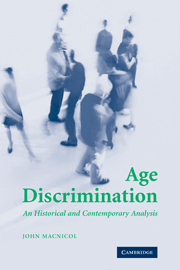Book contents
- Frontmatter
- Contents
- List of figures
- List of tables
- Acknowledgements
- Part I Ageism and Age Discrimination
- Part II The Current Revival of Interest in Britain
- Part III Retirement, health status and work-disability
- 4 Health status and old age
- 5 From the late nineteenth century to the 1940s
- 6 The 1950s and 1960s in Britain
- 7 The recent debate
- Part IV America's Age Discrimination in Employment Act
- Bibliography
- Index
5 - From the late nineteenth century to the 1940s
Published online by Cambridge University Press: 24 August 2009
- Frontmatter
- Contents
- List of figures
- List of tables
- Acknowledgements
- Part I Ageism and Age Discrimination
- Part II The Current Revival of Interest in Britain
- Part III Retirement, health status and work-disability
- 4 Health status and old age
- 5 From the late nineteenth century to the 1940s
- 6 The 1950s and 1960s in Britain
- 7 The recent debate
- Part IV America's Age Discrimination in Employment Act
- Bibliography
- Index
Summary
The quest for longevity
Throughout history, mankind has been fascinated by the possibility of achieving immortality, via the ‘quest for longevity’ or ‘prolongevity’. In medieval times, even the most omnipotent ruler had to face the humiliating prospect of death, along with the lowliest peasant. The possibility of cheating death became a growing obsession in human societies – particularly during the eighteenth-century Enlightenment, with its faith in the perfectibility of mankind. Paradoxically, to achieve near-immortality, and become at one with the angels, has been a recurring goal of post-Enlightenment scientific rationalism. Social history is replete with stories of extreme old age, many of them apocryphal or exaggerated. Figures like Thomas ‘Old’ Parr, of Shropshire, became legends: his age was claimed to be 152 years and 9 months when he died in London in 1635 (and was examined as a freak of nature by William Harvey). Parr was said to have married for the first time at the age of 80, and again at 132; in the interim, he allegedly performed penance for fathering a child out of wedlock. Disappointingly, it is likely that Parr was in fact three generations of one family. A similar heroic individual was Christian Jacobsen of Denmark, who died in 1772 allegedly aged 145 and claimed to have lived under seven Danish kings. Such mythical centenarians have always had a strong appeal, since they appear to stand as exemplars of what could be achieved in a perfect world.
- Type
- Chapter
- Information
- Age DiscriminationAn Historical and Contemporary Analysis, pp. 133 - 150Publisher: Cambridge University PressPrint publication year: 2006



